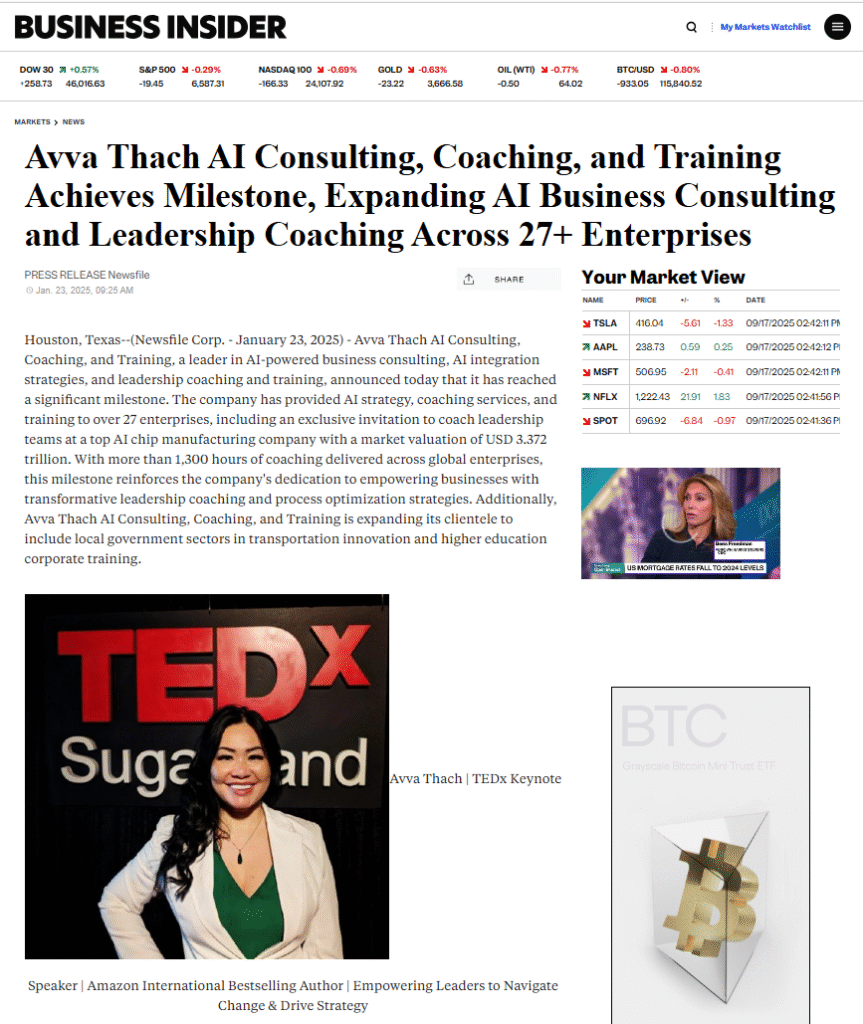The Science Behind Effective Leadership Coaching: What Really Works
In today’s fast-paced business environment, effective leadership is more crucial than ever. With the increasing demand for transformational leadership coaching and executive coaching, understanding the mechanisms that make coaching successful is vital. This blog delves into the science behind leadership coaching, uncovering what truly works to enhance leadership skills and drive organizational success.
The Foundation of Leadership Coaching: Psychological Principles
When it comes to effective leadership coaching, diving into the psychological principles is like opening a treasure trove of insights. Think of it as the secret sauce behind helping leaders not just survive but thrive amidst challenges. After all, 70% of employees who decide to pack their bags and leave do so because of their manager (Gallup). So, let’s unpack what makes leadership coaching tick from a psychological standpoint.
Understanding Behavioral Science
- Emotional Intelligence: A key player in leadership development. Leaders with high emotional intelligence can navigate complex interpersonal dynamics more effectively. It’s about understanding others’ emotions as well as managing your own, which is crucial in fostering positive team environments.
- Cognitive Flexibility: Embracing change with open arms (and maybe a cup of coffee). Cognitive flexibility enables leaders to adapt their thinking and strategize effectively in ever-evolving business landscapes. It’s the Jedi mind trick that turns potential obstacles into opportunities.
The Role of Motivation
The heart wants what it wants, and so does motivation. Effective leadership coaching taps into intrinsic motivation by aligning personal values with organizational goals.
- Autonomy: Providing leaders with the freedom to make decisions empowers them to take ownership and drive innovation.
- Mastery: Encouraging continuous learning and skill-building keeps leaders engaged and on top of their game—like upgrading from a lightsaber to dual wielding.
- Purpose: Connecting daily tasks to broader organizational impact infuses work with meaning, making those Monday blues vanish faster than coffee on a busy morning.
Cultivating Resilience
No one said being a leader was easy, but building resilience ensures they can weather any storm without losing their cool—or their team! Leadership training often incorporates strategies for stress management and fostering resilience, turning adversity into an invaluable lesson rather than an insurmountable hurdle.
The science behind effective leadership coaching doesn’t just create better leaders; it builds better teams, stronger organizations, and ultimately happier workplaces. It’s like planting seeds for growth that sprout into forests of innovation and collaboration. For more on how AI strategies can enhance these principles, check out our insights on AI-driven competitive advantages.
Key Components of Effective Leadership Coaching
Ah, leadership coaching—the art and science of transforming good managers into great leaders. The secret sauce that makes this all the more effective? It’s not just about barking orders or delivering monologues that would rival Shakespeare’s finest works. Instead, it’s a symphony of carefully orchestrated components designed to elevate leadership to a whole new level. Let’s dive in!
1. Personalized Approach
Just like snowflakes, no two leaders are the same—unless we’re talking about their uncanny ability to dodge morning meetings. Tailored coaching plans acknowledge individual strengths and weaknesses, providing customized leadership coaching tailored for each leader’s unique needs. Transformational leadership coaching is achieved by aligning these personal growth journeys with organizational goals.
2. Constructive Feedback
Feedback is the breakfast of champions! But let’s face it—eating feedback isn’t always palatable unless it’s served constructively. Effective leadership coaching involves regular, candid feedback to help leaders identify areas for improvement and celebrate wins, big or small.
- Balanced Critique: A mix of positive reinforcement and constructive criticism keeps morale high.
- Actionable Insights: Feedback should lead to actionable steps for growth.
3. Goal Setting and Accountability
An old adage goes: “A leader is best when people barely know he exists; when his work is done, his aim fulfilled, they will say: we did it ourselves.” (Source) To get there, goal setting is crucial. Through strategic planning and accountability measures, leaders bridge the gap between vision and reality.
- S.M.A.R.T Goals: Specific, Measurable, Achievable, Relevant, Time-bound goals create the roadmap for success.
- Regular Check-ins: Ensuring that progress aligns with objectives through consistent evaluations.
4. Skill Development Workshops
If you’ve ever tried assembling furniture without instructions (or trying to make sense of them), you understand the importance of proper training! Leadership workshops focus on upskilling leaders with communication skills, emotional intelligence, and decision-making prowess.
- Interactive Sessions: Engaging activities that put theory into practice.
- Diverse Topics: Covering everything from crisis management to fostering innovation.
5. Emphasis on Emotional Intelligence (EQ)
The heart knows things that reason cannot explain—and so do emotionally intelligent leaders! Understanding one’s emotions and those of others is vital in creating a cohesive team environment where everyone feels valued and heard.
This multifaceted approach ensures that leadership coaching is not only effective but also transformative—turning potential into performance with each session. Discover how this magic unfolds by reading more about our approach in how Fortune 100 companies leverage these principles for competitive advantage.
The Role of Leadership Development Tools and Techniques
In the ever-evolving world of business, effective leadership is no longer about simply calling the shots—it’s about inspiring teams, fostering innovation, and adapting to change. To achieve these goals, leaders need more than natural charisma; they require well-honed skills cultivated through strategic leadership coaching tools and techniques.
1. Tailored Leadership Development Programs
One-size-fits-all may work for baseball caps, but not for leadership development. Effective programs are customized to address the unique strengths and weaknesses of each leader while aligning with organizational goals. For instance, a survey by Deloitte found that 86% of organizations see customized leadership programs as critical to their success.
2. 360-Degree Feedback Mechanisms
Feedback isn’t just for reality TV talent shows; it’s a crucial component in leadership growth. The 360-degree feedback tool provides leaders with insights from peers, subordinates, and supervisors. This comprehensive perspective helps in recognizing blind spots and areas for improvement—a bit like finding out why your favorite karaoke song doesn’t sound as good live.
3. Executive Coaching Sessions
The magic of executive coaching lies in its ability to reshape leadership styles through personalized guidance. By working one-on-one with seasoned coaches, leaders can develop critical skills such as decision-making prowess and emotional intelligence (EQ). According to a study by the International Journal of Evidence Based Coaching and Mentoring, 80% of people who receive coaching report increased self-confidence and enhanced performance.
4. Simulation-Based Training
No one wants to be caught off guard when facing real-world challenges—cue simulation-based training! These immersive experiences allow leaders to practice handling complex scenarios without real-life consequences. Think of it as a leadership escape room where strategies are tested under pressure without breaking a sweat (or anything else).
5. Digital Platforms for Continuous Learning
With the rise of digital transformation (cue buzzword alert!), virtual learning environments have become indispensable for leadership training. Platforms offering resources like webinars, online courses, and forums keep leaders up-to-date with industry trends and best practices—conveniently accessible at the click of a mouse or swipe of a finger.
The integration of these tools into leadership development ensures that today’s business leaders are well-equipped to steer their organizations toward success in an unpredictable world. So whether you’re refining your own skills or designing programs for your team, remember that effective leadership development is both an art and a science—best served with a side of humor!
The Impact of Executive Coaching on Organizational Success
In the ever-evolving business landscape, executive coaching has emerged as a secret sauce for organizational success. This subtle blend of guidance and strategic insight has been likened to having a GPS in a maze—essentially turning your company’s leaders into human compass needles, pointing straight to success.
Unlocking Leadership Potential
Imagine unbridling the latent potential within your leadership team. Executive coaching does exactly that by equipping leaders with the tools they need to face modern challenges head-on. According to a study at Harvard Business Review, 68% of leaders acknowledge that integrating executive coaching significantly boosts their effectiveness. This is no small feat when considering the complexity of today’s corporate environments.
- Enhanced Decision-Making: Through structured feedback and tailored approaches, executives learn to make better decisions aligned with organizational goals.
- Improved Communication: Coaching fosters superior communication skills, paving the way for more cohesive team dynamics.
- Increased Adaptability: Leaders become more adept at navigating change and uncertainty, essential in a world where the only constant is change.
Cultivating Organizational Culture
The ripple effects of executive coaching extend beyond individual leaders—it permeates the organizational culture. When leadership embraces growth through coaching, it sets a precedent for continuous learning and development across all levels.
- Fostering Innovation: A culture that values personal development encourages creativity and innovation among team members.
- Nurturing Resilience: Organizations become more resilient as leaders develop the capacity to handle setbacks with poise and strategic agility.
- Driving Collaboration: As communication improves, so does collaboration among teams, leading to improved productivity and enhanced problem solving capabilities.
The cumulative impact of these transformations can significantly streamline operations and drive measurable growth—a concept we delve deeper into in our article on AI Business Strategy: The Key to Transformational Success.
A Real-World Example
An example that comes close is Apple under Steve Jobs’ visionary leadership (and perhaps his penchant for turtlenecks). Jobs’ approach was less about dictating what should be done and more about nurturing an environment where creativity could thrive. Although not explicitly mentioned as “executive coaching,” his influence exemplifies how transformative guidance can lead to monumental success—proving once again that “the only way to do great work is to love what you do.”
If you’re ready to see these benefits in action within your organization, consider exploring our comprehensive insights on how Fortune 100 companies are leveraging AI for competitive advantage here.
The power of executive coaching lies not just in transforming individuals but in elevating the entire organization towards sustainable success.
Measuring the Success of Leadership Coaching Programs
In the realm of leadership coaching, understanding success is as crucial as the coaching itself. It’s like baking a cake—sure, you know you followed the recipe, but tasting that delicious slice is where you confirm your culinary prowess. Similarly, measuring the effectiveness of leadership coaching programs ensures that organizations achieve their desired outcomes.
The Key Metrics for Evaluating Leadership Coaching
- Behavioral Change: The most noticeable outcome of successful coaching is a shift in behavior. Leaders should exhibit improved decision-making, enhanced communication skills, and increased empathy towards team members.
- Goal Achievement: Clear goals set at the beginning serve as benchmarks. Evaluate how well these goals are met by using pre-defined KPIs such as project completion rates or employee satisfaction scores.
- Feedback from Peers and Subordinates: Collecting feedback offers invaluable insights. A leader’s transformation is often first recognized by those around them—those who witness new leadership styles manifesting in everyday interactions.
- Quantitative Performance Data: Numbers don’t lie! Track metrics like revenue growth, reduction in employee turnover, and improvements in productivity to gauge tangible outcomes.
A fascinating fact from the International Coach Federation reveals that companies who utilize coaching strategies experience a 70% improvement in work performance and a 51% improvement in team effectiveness (Source: ICF Global Coaching Client Study). With stats like these, embracing leadership coaching doesn’t just feel right; it quantifies success!
The ROI of Leadership Coaching: A Real-Life Example
Consider this example: A mid-sized tech firm embraced strategic leadership coaching for their managers. After just six months, they saw a significant boost in project delivery timelines—an impressive 30% faster than before. Not only did this bolster client satisfaction but also increased team morale significantly.
If you’re curious about how AI can further amplify these outcomes, check out our insights on leveraging AI for competitive advantage at Fortune 100 Companies Leveraging AI for Competitive Advantage.
The bottom line? Effective leadership coaching isn’t just fluff or fancy titles; it’s about real results that translate into organizational growth and innovation—now that’s something worth measuring!
The Future of Leadership Coaching: Emerging Trends
As we navigate the rapidly evolving corporate landscape, the future of leadership coaching promises to be as dynamic as a cat on a treadmill. The emerging trends highlight a shift towards more personalized and tech-driven approaches. Let’s dive into what this means for the leaders of tomorrow.
1. AI-Powered Insights
The integration of Artificial Intelligence in leadership coaching is not just another buzzword; it’s a game-changer. AI-driven analytics provide leaders with data-backed insights, enabling them to make informed decisions with the precision of a high-stakes chess player.
- Predictive Analytics: Identify potential leadership gaps before they become corporate headaches.
- Personalized Feedback: Tailor coaching plans based on individual performance metrics to enhance leadership effectiveness.
2. Virtual Reality (VR) Training
If you thought VR was only for gamers and Star Trek fans, think again. VR is making waves in leadership development by simulating real-world scenarios that sharpen decision-making skills.
- Immersive Workshops: Experience scenarios that challenge your team leadership skills in a risk-free environment.
- Interactive Simulations: Test your strategic leadership coaching abilities without leaving the office chair.
3. Focus on Emotional Intelligence (EI)
No longer is EI the secret sauce whispered about in boardrooms; it’s becoming mainstream in management coaching. Leaders are being trained to harness emotional intelligence to improve team dynamics and drive business success.
- Cognitive Behavioral Techniques: Equip leaders with strategies to manage stress and foster resilience.
- Mood Metrics: Use technology to monitor and adapt to emotional cues within teams, ensuring harmonious workplaces.
A New Paradigm for Leadership Growth
The evolution of leadership training isn’t just about adopting new tools—it’s about cultivating a mindset primed for change. As Ronald Reagan wisely noted, “Management is doing things right; leadership is doing the right things.”
The future of leadership coaching will undoubtedly challenge traditional norms and create opportunities for growth that were once thought impossible. So, buckle up—it’s going to be an exciting ride!
Conclusion: Unlocking Leadership Potential Through Science-Backed Coaching
In the ever-evolving corporate ecosystem, effective leadership is not merely an asset—it’s a necessity. However, unlocking leadership potential requires more than just a one-size-fits-all approach. Enter: science-backed coaching methods that are designed to empower leaders to not only meet but exceed their strategic goals.
The Analogies and Anecdotes of Leadership Coaching
- The “Thinking Cap” Effect: Just as a hat protects your head, comprehensive leadership coaching guards against decision-fatigue and cognitive overload, allowing leaders to make more informed choices.
- The “GPS for Success”: Think of coaching as the GPS recalibrating you on your journey to effective leadership. Whether you take a wrong turn or hit traffic (hello, surprise budget cuts!), coaching redefines your route efficiently.
- The “Swiss Army Knife” of Skill Development: Executive coaching arms leaders with versatile skills tailored for real-world challenges—from enhanced emotional intelligence (EQ) to strategic foresight.
Harnessing Data-Driven Insights
According to a study by Forbes, organizations that utilize data-centric approaches in leadership coaching see up to a 29% increase in performance metrics across various departments (source). When paired with personalized feedback loops, leaders gain actionable insights into their own behavioral patterns and areas for improvement.
Science Meets Empathy: The Human Element
While data may drive understanding, empathy fuels connection. Effective leadership strategies rely heavily on the coach’s ability to humanize the process—not just treating symptoms but addressing root causes. This is where our approach at Avva Thach comes into play: blending AI precision with human intuition to create an impactful coaching experience. Learn more about how we integrate these elements into our programs by visiting our page on transforming leadership through executive coaching at Avva Thach.
A Little Humor Goes a Long Way
Let’s face it—leading people can be like trying to herd cats some days! But that’s why humor is an essential tool in any leader’s arsenal. It breaks down barriers and fosters open communication within teams. So next time you’re faced with a daunting challenge, remember: A little laughter today can lead to stronger collaborations tomorrow.
As businesses continue to navigate digital transformation and AI integration (learn how Fortune 100 companies leverage AI here), embracing science-backed leadership coaching could very well be your ticket to not just surviving—but thriving—in today’s complex business landscape.














Leave a Reply